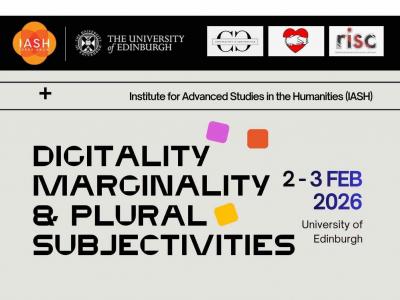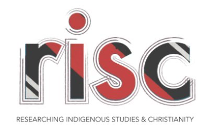
Organisers: Dr Deepshikha Behera (IASH Digital Research Postdoctoral Fellow), and Dr Rathiulung Elias KC (IASH Visiting Research Fellow).
This conference is supported by the Susan Manning Workshop Fund from the Institute of Advanced Studies in the Humanities (IASH), University of Edinburgh. To register for online attendance for all three days, please click here. The link to register for in-person attendance on the first two days will be posted shortly.
Click here to download this CfP as a PDF.
Dates: 2 - 4 February 2026
Venue (Hybrid): The Institute for Advanced Studies in the Humanities (IASH), Edinburgh and Online
IASH, 2 Hope Park Square, Edinburgh EH8 9NW
Digitality, among marginalized communities, has become central to the negotiation of identities that are formed through acts of solidarity, registering resistance and sometimes in the act of performing the ‘everyday’. The domain of digitality is a complex site of negotiating socio-political and cultural histories of knowledge production and dissemination. This conference seeks to explore the transformative potential of digital environments as spaces for plural world-making, where plural identities take shape, language-cultures intermingle, and local and global imaginaries intersect. While digital spaces have become sites of articulating subjectivities and registering lived experiences, they are burdened with concerns of censorship, surveillance and misuse of data. They also draw our attention to the manner in which these digital networks are developed, designed and regulated, often replaying the latent bias and standardised prejudice of models based on architectures of colonial epistemologies. However, latent within these models are the ways in which specific algorithmic engagement critiques the homogenisation of cultural and linguistic differences while outlining alternate practices of digital mediation especially in a decolonial context.
From digital activism to storytelling, to community archives and creative expression, contemporary digital practices complicate fixed ideas of identity and generate new vocabularies for agency and solidarity. At the same time, emerging digital research methods such as digital archives, digital ethnography, network analysis, and critical data studies have paved the path for new forms of engagement with these formations of selfhood across mediated, multilingual, and affective spaces. For communities historically excluded from dominant narratives, the digital sphere offers both opportunity and risk. It provides visibility, connection, and creative agency, while also reproducing hierarchies of power and forms of surveillance.
We invite abstracts that examine how digital environments, particularly social media platforms and digital research methods, contribute to the formation of plural subjectivities and open new spaces for belonging, resistance, and imagination. Aimed at rethinking how marginalized subjects navigate these contradictions and how their identities are shaped through the dynamics of digital circulation, visual culture, and economies of attention and engagement with digitality, we invite interdisciplinary contributions that examine how digital infrastructures and aesthetics shape the lived experiences of marginalized groups in multicultural contexts. Possible themes include but are not limited to:
- Digital subjectivities and counter-narratives: social media as a space for performing identity, belonging, plural selves, and intimacies.
- Visual and narrative resistance: digital storytelling, visual cultures, and the creation of decolonial counter-histories.
- Intersectional and decolonial solidarities: forging alliances and reimagining communities through digital activism and affect.
- Ecology, knowledge, and spirituality in a digital age: traditional knowledge, religiosity, and ecological discourse, and epistemic justice.
- Language, marginality, and decoloniality: linguistic practices, and translation in digital resistance, and rewriting histories.
- Digital power and epistemic justice: algorithmic bias, data colonialism, and decolonial digital methods for studying marginality.
By bringing together scholars from diverse disciplines and across geographical locations, we highlight the epistemic plurality of digital experience. We ask how digitality can become a space for reimagining subjectivity beyond standardised constructs of fixed identity categories, i.e. nation, region, gender, race, class, caste, disability and sexuality to name a few. Additionally, it addresses the manner in which plural subjectivities are fashioned through an interplay of engaging with differences and overlaps, a condition intrinsic to decoloniality. In mapping the intersections between digitality, marginality, and plurality, the conference seeks to rethink the politics of representation and the ethics of knowledge production in the digital age. We invite critical interventions that respond to these questions and extend the conversation on how digitality continues to shape what it means to mutually coexist alongside differences while reconceptualizing decoloniality and ethics of engagement as an everchanging process. We also seek to include different points of arriving at the question of digital by selecting papers that address distinct concerns around politics of language, culture, food, sexuality, disability, race, class, caste among others.
___
GUIDELINES
Submissions are now closed.
We are expecting a 20-minute presentation followed by Q&A.
Paper selection will be based on merit, relevance to the theme, and the inclusion of diverse contexts, perspectives, and disciplines. We also welcome contributions that go beyond traditional academic papers- such as visual presentations, media galleries, digital storytelling, or other creative formats that expand the theme through alternative modes of knowledge production and expression.
For any queries, contact us at digitalmarginalities@gmail.com.
TRAVEL BURSARIES:
As part of the Susan Manning Workshop Fund, we are providing a travel bursary for up to two scholars based in the UK representing minority perspectives within the discourse whose abstracts have been selected for the conference.
OUTPUTS AND PARTNERS:
- All presenters will be acknowledged with a certificate of presentation.
- We plan to develop selected papers for a Special Issue in a peer-reviewed interdisciplinary journal.
- Due to the diversity of presentation formats, we may curate and showcase visual and media-based works through online platforms: such as an online magazine or publications on social media, in collaboration with our partners. This shall also ensure that the concerns raised by the critical engagement in the conference are aligned with community practices and initiate a conversation with the members of the community beyond academia.
|
Comparatists in Conversation |
Researching Indigenous Studies & Christianity (RISC) |
Young Tribal Women Network |
|---|---|---|
|
|
|
|



